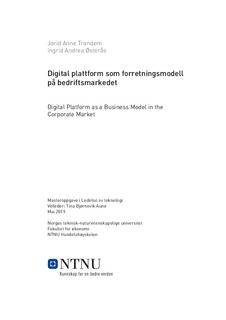| dc.description.abstract | Denne masteroppgaven undersøker digitale plattformer som en forretningsmodell. En digital plattform er en arena hvor transaksjoner og verdiskapende interaksjoner mellom ulike parter muliggjøres. En viktig del av dagens samfunn er digitalisering, hvor digitale plattformer er en drivende teknologi. På forbrukermarkedet er det tydelige plattformsuksesser som Amazon, Uber og Airbnb. Industrisamfunnet posisjoneres nå mot en ny plattformorganisering, noe som medfører at etablerte virksomheter kan endre posisjon. Utviklingen av plattformøkonomien foregår imidlertid på en annen måte på bedriftsmarkedet enn på forbrukermarkedet. På bakgrunn av dette skal studien besvare følgende problemstilling: Hva kjennetegner digitale plattformer som forretningsmodell på bedriftsmarkedet, og hva bør bedrifter vektlegge når digitale plattformer benyttes?
For å besvare problemstillingen har vi benyttet en kvalitativ forskningsmetode. Vi har valgt å gjennomføre en enkeltcasestudie med fire analyseenheter. Alle analyseenhetene er digitale plattformer som er startet opp av, eller i samarbeid med, allerede etablerte selskaper. Datagenereringen er basert på semistrukturerte dybdeintervju med informanter fra de digitale plattformene, samt møter og intervju med personer som har kunnskap om temaet. I tillegg er det inkludert et bredt spekter av litteratur om digitalisering, plattformøkonomien, digitale plattformer, samt dataøkonomien for å kunne belyse problemstillingen.
Våre funn viser at når bedrifter skal benytte digitale plattformer som forretningsmodell på bedriftsmarkedet kan det være gunstig med en helhetlig tilnærming. Samtidig er det viktig at selve plattformen har et konkret fokus for å levere høy verdi til involverte aktører. Resultatene viser at bedrifters kompleksitet, behov for tilpasning, tradisjonelle salg- og relasjonsarbeid kan sette begrensninger for å kunne få automatisert prosesser på digitale plattformer. Studien viser at allerede etablerte bedrifter med store ressurser og eksisterende kundebase ofte har et fortrinn ved etablering av digitale plattformer. Et viktig moment for suksess med digitale plattformer er tillit. Bedrifter bør ha et mer helhetlig fokus på tillit, i tillegg til fokuset på sikkerhetsmekanismer. En tydelig tendens er at dataøkonomien og deling av data i stor grad preger digitale plattformer på bedriftsmarkedet. I fremtiden kan det være nødvendig med datadeling mellom digitale plattformer, siden disse trolig må forholde seg til hverandre. Funnene våre indikerer at dette er et komplekst område som bør vies større oppmerksomhet. | |
| dc.description.abstract | This master’s thesis examines digital platforms as a business model. A digital platform is an arena where transactions and value-creating interactions between different parties are made possible. An important part of today’s society is digitalization, where digital platforms are a thriving technology. In the consumer market, there are platform successes such as Amazon, Uber and Airbnb. The industrial society is now positioning towards a new platform organization, which can lead to a changed position for established businesses. However, the development of the platform economy evolves in a different way in the corporate market compared to the consumer market. With that in mind, this study will approach the following research question: “What characterize digital platforms as a business model in the corporate market, and what companies should emphasize when digital platforms are used?”
To answer our research question, we have used a qualitative research method. We have chosen to conduct a single case study with four units of analysis. The units of analysis are digital platforms that have been started by, or in cooperation with, established companies. Our empirical data is mainly based on semi-structured in-depth interviews with informants representing each digital platform, as well as meetings and interviews with people that has extensive knowledge about the topic. To approach this research question, a wide range of literature regarding digitalization, the platform economy, digital platforms, and the data economy have been included.
Our findings show that when companies use digital platforms as a business model in the corporate market, a holistic approach can be beneficial. It is also important that the platform itself has a specific focus in order to deliver high value to the actors involved. The results show that companies’ complexity, need for adaption, traditional sales and relationship management may limit the ability to automate processes on digital platforms. This study shows that established companies with great resources and existing customer base often have an advantage when establishing digital platforms. An important factor for success with digital platforms is trust. Companies should have a more holistic focus on trust, as well as their focus on security mechanisms. A clear trend is that the data economy and data sharing to a large extent affect digital platforms in the corporate market. In the future it could be necessary to share data between digital platforms, since many of these probably must relate to each other. Our findings indicate that this is a complex topic that should be given greater attention. | |
